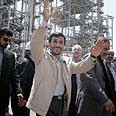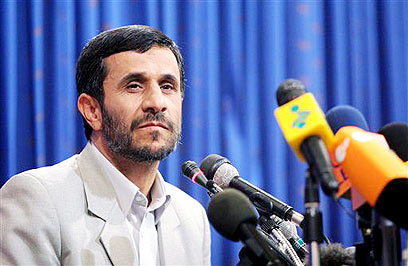
Iran ignores powers, UN on enrichment
Defiant Iran keeps on enriching uranium up to two days before Security Council's deadline for Tehran to freeze such activity or face threat of sanctions, UN and European officials say. 'Sanctions cannot dissuade Iranian nation from achieving our lofty goals of progress,' Ahmadinejad says
Iranian President Mahmoud Ahmadinejad urged European members of the council against resorting to sanctions, saying punishment would not dissuade his country from pursuing its disputed nuclear program.
"Sanctions cannot dissuade the Iranian nation from achieving our lofty goals of progress. So it's better for Europe to be independent (of the US) in decision-making and to settle problems through negotiations," Ahmadinejad said Wednesday, according to state-run television.
Iran could theoretically still announce a full stop to enrichment before the deadline set by the Security Council. But that appeared unlikely, considering Tehran's past refusal to consider such a move and findings by the International Atomic Energy Agency that it was enriching small quantities of uranium as late as Tuesday.

Ahmadinejad, this week (Photo: AP)
Iran's refusal to heed the Security Council up to now will be detailed in a confidential IAEA report to be completed Thursday and circulated among the Vienna-based agency's 35 board member nations. The report also will include new details on Tehran's research into advanced enrichment equipment, and other points, diplomats accredited to the agency told The Associated Press.
The report, also scheduled to go to the Security Council on Thursday, would likely trigger council members to consider economic and political sanctions. Russia and China, however, were likely to resist US-led efforts for a quick response, which likely means sanctions do not loom immediately.
An earlier resolution on Iran took weeks for the Security Council members to negotiate, as did talks over a weaker council statement earlier this year demanding that Iran suspend enrichment. As well, the IAEA report may not be formally considered by the Security Council before the agency's board meets and approves it in mid-September.
It's not even clear when exactly the deadline will run out. The US ambassador to the United Nations John Bolton, said Wednesday that he believed it would end at 12:01 a.m. Friday in Tehran — or 3:31 p.m. Thursday at the Security Council in New York.
Iran: We have a right to enrich
But diplomats said the exact timing was not particularly relevant for two reasons: They believe Iran already has given its answer; and they would almost certainly abandon their sanctions threat if Iran decides to suspend enrichment after the deadline.
Bolton said the US still has not decided how it will formally respond once the deadline expires, though he will likely make some sort of statement on Thursday afternoon. He repeated, however, that Washington would seek sanctions if Iran disregards the resolution.
"That has been our intention for some months, it remains our intention, it'll be our intention on September the first if the Iranians don't comply with the resolution," he said.
Even Moscow and Beijing, which have traditional economic and strategic ties with Tehran, are increasingly vexed at what world powers consider Iranian intransigence on enrichment — a process that generates nuclear energy but also creates the fissile core of warheads.
In another sign of Iran's willingness to confront the international community, a senior European government said Tehran had not responded to a recent European Union offer on behalf of the five Security Council members plus Germany to discuss Tehran's terms for new nuclear talks. Such behavior would likely strengthen Washington's push to move more quickly toward economic sanctions.
IAEA inspectors remained in Iran on Wednesday, gathering information to go into Thursday's confidential report. While their most recent findings were not available by Wednesday afternoon, a senior UN official said Wednesday that Iranian centrifuges were enriching small quantities of uranium gas as late as Tuesday.
The latest enrichment — in a series of such activities over the past few months — was first reported Wednesday by The Washington Post.
Iran insists it has a right to enrich for what it says is a future nuclear power program. The concern, however, is that Tehran could misuse the technology to aim for material enriched to the level required for weapons.
'Inadequate response'
The United States, Russia, China, Britain, France and Germany offered Iran on June 1 a package of technological and political incentives in exchange for a commitment from Tehran to freeze enrichment before talks began.
Tehran's response Aug. 21 has been characterized by heads of governments and senior diplomats as inadequate because it makes no mention of any willingness to suspend enrichment before talks, let alone consider a long-term moratorium on such activity. Senior diplomats have told The Associated Press it will be rejected.
Senior EU foreign policy official Javier Solana has nevertheless offered to meet with Iranian nuclear negotiator Ali Larijani to explore if there is common ground, the diplomats said. But up to now Iran has snubbed that overture, a senior European official said from outside Vienna.
A European official in another capital agreed: "Nothing has moved over the past few days."
The IAEA report will contain other information the US and its allies would likely seize on, diplomats said, including confirmation that:
- IAEA inspectors were recently refused onsite inspections of a vast underground facility being built at Natanz to house up to 54,000 centrifuges, which spin uranium gas into enriched material. While Tehran's centrifuge program is hamstrung by technical problems, the Washington-based Institute for Science and International Security has suggested that — if it were interested in producing bombs — Iran could create a basic small plant of 1,500 centrifuges to make enough bomb fuel for one weapon within three years.
- For now, Iran's known enrichment capabilities consist of 164 interconnected centrifuges at its surface pilot plant at Natanz, which has been used to turn out small quantities of low-enriched uranium. But the report will reveal new details of the country's centrifuge program, including confirmation from Larijani that scientists are doing computer-based research on a more advanced type of centrifuge that works faster and turns out larger quantities of enriched uranium.
The report will also focus on lack of progress in investigating suspicious findings — because of Iran's refusal to provide information — such as diagrams showing how to mold fissile uranium into the shape of warheads.
Iran has been under IAEA investigation since 2003, with inspectors turning up evidence of clandestine plutonium experiments, black market centrifuge purchases and links to the military of what Iran says is a civilian nuclear program.










